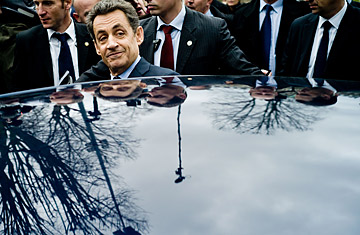
France's President Nicolas Sarkozy gets in to his car after making his New Year wishes speech to civil servants. on January 12, 2012 in Lille, northern France.
This is not at all how Nicolas Sarkozy hoped his re-election bid would go. During a campaign visit to the city of Bayonne on March 1--less than two months before the first round of voting on April 22--the French President found himself surrounded by a crowd of locals he thought had come to cheer him. Instead they shouted insults and forced him to seek refuge in a bar. A week later, another hostile horde jeered Sarkozy at a stop in the town of St.-Just-St.-Rambert in central France.
The man besieged by angry voters is the same man who rallied a NATO-led coalition to intervene in Libya, preventing the likely slaughter of civilians in the rebel-held parts of the country and leading to the ouster of dictator Muammar Gaddafi. He also helped spearhead the coordinated bank rescues across the European Union in response to the financial crisis that began in 2008. And last year he partnered with German Chancellor Angela Merkel to persuade European leaders to fund bailouts for countries on the verge of defaulting on their debts--a measure that may have saved the euro and prevented a worldwide financial meltdown. Sarkozy is a globally respected leader and formidable campaigner. So why do polls forecast he will lose the May 6 presidential runoff to his Socialist opponent, Franois Hollande, a man who has never held national office?
'The President of the Rich'
The short answer is c'est l'conomie, stupid. Although many French voters give Sarkozy credit for his work with Merkel to save the common currency, they blame him for contributing to France's sizable debt. Under Sarkozy's nominally conservative reign, increased spending lifted the country's debt from $1.6 trillion in 2007--his first year in power--to more than $2.2 trillion in 2011. That means debt grew from 64.2% of French GDP in 2007 to 85.3% last year.
Frustration at the rising debt burden sharpened late last year when Sarkozy embraced Merkel's continent-wide austerity gospel with belt-tightening measures worth $24.6 billion. The public mood darkened further after Sarkozy's stated reason for the deep spending cuts--preserving France's AAA credit rating--went up in smoke in December, when Standard & Poor's downgraded the rating to AA. France is now facing dismal growth forecasts, falling income levels and a rising unemployment rate that is expected to surpass 10% this year. "His international and European achievements notwithstanding," says Thomas Klau, head of the Paris office of the European Council on Foreign Relations, "Sarkozy is being judged by voters almost exclusively on his domestic record."
Voters are also put off by Sarkozy's reputation as a member of the 1%. The moniker "President of the rich," inspired by a round of tax cuts in 2007 that mostly benefited the wealthy, has stuck with him. Sarkozy's unabashed fondness for money and his friendships with some of France's wealthiest people have solidified his image as the king of bling. So too has his lush life with his third wife, millionaire and former model Carla Bruni, who convinced no one in her attempt in March to defend her husband's taste for luxury by assuring a journalist, "We're modest people."
A Hard Turn Right
